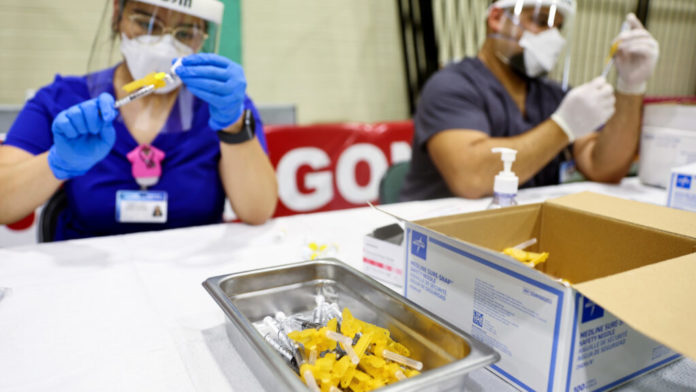
Biden administration health officials said Wednesday they would accelerate access to vaccines and treatments for monkeypox, as the White House combats criticism that it has presided over a slow-footed and error-prone response to an outbreak that has largely affected men who have sex with men.
The administration will make 1.8 million additional doses of the two-dose Jynneos vaccine and 50,000 courses of Tpoxx, the only antiviral being used for treating the disease, available to states and local governments.
In addition, the CDC said it would launch a pilot program to make 50,000 vaccine doses available at events with high attendance of gay and bisexual men. Southern Decadence — often compared to gay Mardi Gras — in New Orleans and Black Pride in Atlanta are both set to begin in the next three weeks, and officials argued that the new outreach efforts could help attenuate the sharp racial inequities seen so far in the virus’ spread and access to vaccines and testing.
advertisement
There have now been more than 13,500 confirmed monkeypox cases in the U.S. CDC Director Rochelle Walensky said Wednesday that 98% were in men and, among those for whom sexual history was available, 93% were in men who have sex with men. About 35% of people with the disease are white, while 33% are Hispanic and 28% are Black — numbers well above the proportion of the population.
Upcoming “are really events that do focus on on populations who are overrepresented in this outbreak, including the trends that we’re seeing in and among Black and Latino individuals,” Demetre Daskalakis, a CDC official and deputy coordinator of the White House’s monkeypox response, told reporters Wednesday. “It’s really about positioning both messaging and biomedical intervention where people can reach it, but then also making sure that we’re going to the right places and talking to the right people.”
advertisement
Although the new efforts will likely be welcome news to patients and advocates, who have clamored for greater access to treatments and vaccines, it’s not clear exactly how great a dent the measures — which the White House is calling “Phase Four” in its response — will make.
Officials said Wednesday that vaccine would be available only to localities that have administered more than 90% of their allocated doses and are using the intradermal, or under-the-skin, method of administration the White House has pushed this month.
This method can produce a stronger immune response, meaning one vial could potentially inoculate five people instead of one. The 1.8 million doses the administration announced today are actually the last 360,000 vials from a shipment of nearly 800,000 vials the FDA cleared for use last month, an HHS spokesperson told STAT.
But some experts and local public health officials have argued that data on the approach is limited and many health care workers may not be properly trained. The CEO of Bavarian Nordic reportedly threatened to cancel all future U.S. orders of the vaccine when he learned of the switch.
Asked for data on how many localities had actually adopted the intradermal method, Robert Fenton, the White House’s recently appointed monkeypox director, demurred, instead listing a couple cities, including Atlanta and Los Angeles, that have started using it. Walensky also noted the agency was working with jurisdictions to give training where needed.
“Really what I will say is the data are coming in,” said Walensky. “What we’re doing is working really … with jurisdictions so they all get to this intradermal dosing.”
The new efforts also still leave questions about other bureaucratic hurdles that have snagged the monkeypox response so far. Local public health officials have complained that the CDC is using a different system for ordering vaccines, creating confusion and delays. And doctors have argued that access to Tpoxx is limited not by supply but by the red tape required to order it.
In addition, officials said the U.S. would receive an additional 150,000 vials of vaccine in September — a month ahead of schedule — and were working to get another 2.5 million vials worth of vaccine into actual vials. Bavarian Nordic announced Thursday afternoon it would team Grand River Aseptic Manufacturing in Michigan to conduct that fill-finish work, with the aim of transferring Bavarian Nordic’s tech in three months and beginning production this year.
The administration previously received criticism for failing to order vaccine on time this spring, allowing doses to go to other countries, although Fenton noted the U.S. currently has “the largest Jynneos vaccine program of any country in the globe.”







